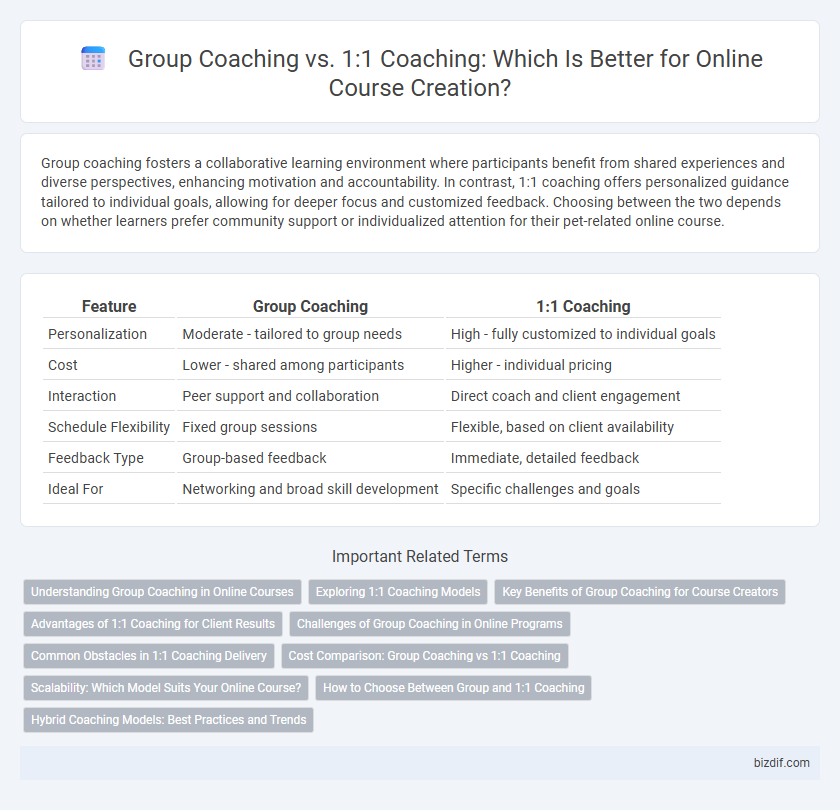Group coaching fosters a collaborative learning environment where participants benefit from shared experiences and diverse perspectives, enhancing motivation and accountability. In contrast, 1:1 coaching offers personalized guidance tailored to individual goals, allowing for deeper focus and customized feedback. Choosing between the two depends on whether learners prefer community support or individualized attention for their pet-related online course.
Table of Comparison
| Feature | Group Coaching | 1:1 Coaching |
|---|---|---|
| Personalization | Moderate - tailored to group needs | High - fully customized to individual goals |
| Cost | Lower - shared among participants | Higher - individual pricing |
| Interaction | Peer support and collaboration | Direct coach and client engagement |
| Schedule Flexibility | Fixed group sessions | Flexible, based on client availability |
| Feedback Type | Group-based feedback | Immediate, detailed feedback |
| Ideal For | Networking and broad skill development | Specific challenges and goals |
Understanding Group Coaching in Online Courses
Group coaching in online courses cultivates collaborative learning by engaging multiple participants simultaneously, fostering diverse perspectives and peer support. It offers scalable interaction through structured sessions, enabling instructors to address common challenges while maintaining community dynamics. This format enhances accountability and motivation by leveraging group energy, making it a cost-effective alternative to individualized 1:1 coaching.
Exploring 1:1 Coaching Models
Exploring 1:1 coaching models reveals a highly personalized approach that adapts to individual learner needs, enhancing skill acquisition and accountability. Compared to group coaching, 1:1 sessions allow for tailored feedback and flexible pacing, resulting in deeper comprehension and accelerated progress. This customization often leads to higher client satisfaction and more effective transformation in online course creation.
Key Benefits of Group Coaching for Course Creators
Group coaching enables course creators to efficiently scale their impact by engaging multiple participants simultaneously, fostering dynamic peer-to-peer learning and collaboration that enhances overall student retention. This format reduces the time and effort spent per individual, allowing creators to maximize earnings without compromising personalized support. Group coaching also builds a vibrant community atmosphere, increasing motivation and accountability among learners, which often leads to higher course completion rates.
Advantages of 1:1 Coaching for Client Results
1:1 coaching offers personalized guidance tailored to the client's specific needs, accelerating skill development and goal achievement. The direct interaction enhances accountability and allows for immediate feedback, boosting motivation and progress. Customized strategies and focused attention in 1:1 coaching significantly improve client outcomes and satisfaction compared to group settings.
Challenges of Group Coaching in Online Programs
Group coaching in online programs often faces challenges such as limited personalized attention, which can hinder individual progress and engagement. Managing diverse participant goals and varying skill levels complicates curriculum pacing and content relevance. Technical issues and coordinating schedules further disrupt group dynamics and learning effectiveness.
Common Obstacles in 1:1 Coaching Delivery
Common obstacles in 1:1 coaching delivery include scheduling conflicts, limited scalability, and personalized pacing challenges that can hinder progress. Coaches often face difficulties in maintaining client motivation and engagement without the dynamic peer support found in group settings. These barriers can impact the overall effectiveness and efficiency of personalized coaching programs.
Cost Comparison: Group Coaching vs 1:1 Coaching
Group coaching offers a more cost-effective solution by distributing expenses among multiple participants, reducing the price per individual compared to 1:1 coaching. In contrast, 1:1 coaching commands higher rates due to personalized attention, tailored strategies, and dedicated time from the coach. Budget-conscious learners seeking affordability often prefer group coaching, while those prioritizing customized guidance invest in 1:1 coaching despite the premium cost.
Scalability: Which Model Suits Your Online Course?
Group coaching offers higher scalability by allowing one coach to engage multiple students simultaneously, reducing time investment per participant and increasing revenue potential. In contrast, 1:1 coaching provides personalized attention but limits client capacity due to time constraints, impacting growth scalability. Course creators aiming for expanded reach and efficient time management often benefit more from group coaching models in online course creation.
How to Choose Between Group and 1:1 Coaching
Choosing between group coaching and 1:1 coaching depends on personalized attention needs and budget considerations. Group coaching offers collaborative learning and peer support, ideal for individuals seeking community and diverse insights. In contrast, 1:1 coaching provides tailored guidance and faster progress, making it suitable for those requiring customized strategies and direct feedback.
Hybrid Coaching Models: Best Practices and Trends
Hybrid coaching models combine group coaching's collaborative energy with personalized 1:1 coaching, maximizing learner engagement and customized support. Best practices emphasize leveraging digital platforms for seamless integration, allowing participants to benefit from peer interaction and targeted feedback. Current trends highlight scalable hybrid solutions that enhance retention rates and foster community-driven learning environments.
Group coaching vs 1:1 coaching Infographic

 bizdif.com
bizdif.com